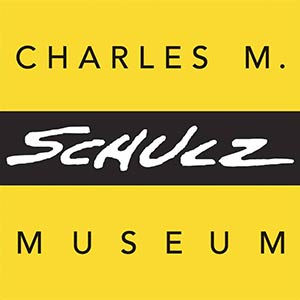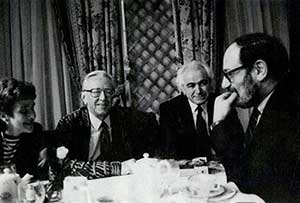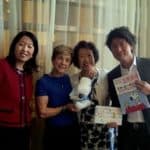Meeting Umberto Eco, January 1990
Umberto Eco (on the right) with Giovanni Trimboli and the two of us at breakfast.
When I read of Umberto Eco’s passing on February 19, 2016, I thought back to the thrill of meeting him in Paris in 1990.
Through the good graces of Giovani Trimboli, one of our Italian licensees, we were able to have breakfast together on the occasion of Sparky’s exhibition in the Louvre (January, 1990).
At the time Umberto Eco had rock star status because his novel, The Name of the Rose, published in 1980 and translated into English in 1983, had been made into a film (1986) directed by Jean-Jacques Annaud and starring Sean Connery and Christian Slater.
I was all ears, but I am embarrassed to confess that I cannot remember any of the discussion, except that here were two men who plainly revered each other. And our host, Giovanni, was ALWAYS good company. I realized how fortunate I was to be sitting at that table.

Sparky signing a book for Umberto Eco, with Giovanni and Fulvia Serra looking on. This 40th anniversary of Peanuts book was edited by Giovanni Trimboli and published by Mondadori. It was also translated into English.
I hadn’t thought I would have had the chance to meet Umberto Eco again, but on March 24, 2010, during the Bologna Book Fair, another opportunity arose.

Fulvia Serra (on my right), Umberto Eco and Anamaria Gandini (to my left)
Our Italian agents, the Massari family, who knew Umberto Eco and his admiration for Peanuts, arranged an afternoon discussion at Bologna University with Umberto Eco and the group of journalists who created Linus Magazine in the 1960s. The principle creators were Anamaria Gandini and her brother Giovanni, who sat at their kitchen table and discussed creating a comic magazine, Linus, which would include the Peanuts characters. Fulvia Serra, another journalist whom I have met several times, who was also in on the creation of the magazine. These journalists and scholars were charmed by Peanuts and wanted to bring it to the Italian public.
This is one of my favorite Eco quotes which I believe applies to Peanuts: “There is nothing more meaningful than a text which asserts that [it has] no meaning.” Wrap your mind around that one!

After the discussion, the entourage walked to dinner at Umberto Eco’s favorite restaurant, Cheserino, a family style trattoria near the University.
I want to recommend an article which I recently rediscovered from the NY Review of Books. While I recommend the entire article, I have included here what I think are some of Eco’s most perceptive comments:
You could never grasp the poetic power of Schulz’s work by reading only one or two or ten episodes: you must thoroughly understand the characters and the situations, for the grace, tenderness, and laughter are born only from the infinitely shifting repetition of the patterns, and from fidelity to the fundamental inspirations…Peanuts charms both sophisticated adults and children with equal intensity, as if each reader found there something for himself, and it is always the same thing, to be enjoyed in two different keys…Peanuts is thus a little human comedy for the innocent reader and for the sophisticated.
Umberto Eco, translated by William Weaver, On ‘Krazy Kat’ and ‘Peanuts,’ The New York Review of Books, June 13, 1985 issue.
–Jean Schulz




